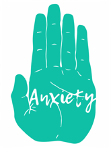
Anxiety is pervasive. It is universally felt and it is increasingly interfering in people’s lives.
Anxiety doesn’t just hijack the brain. It also stakes out spots in the body, sometimes leading to headaches, nausea, muscle tension etc.
Anxiety tends to gain momentum if we don’t intervene in a timely and thoughtful manner.
How can we take control of the growing intensity of anxiety before it becomes unwieldy and out-of-control?
Press the pause button
Though it’s not always intuitive to slow down when emotions and anxiety are building, it is helpful to reflect and then take measures to slow down the sympathetic nervous system. It’s helpful to stop and spend a few seconds to identify the feeling that you’re feeling. This is often called, “name it to tame it.” (Dan Siegel, MD) Describing emotions jumps starts the executive brain (pre-frontal cortex) and calms down the limbic system. It’s physiologically and mentally helpful to pause when the body is revving up.
It’s a good idea to check in with the way that you’re breathing. Slowing your breathing down can be incredibly helpful as you reset. For some, it helps to exhale first and then take a long slow inhale. Then continue by taking deep cleansing breaths in through the nose, holding the breath and exhaling through the mouth. Repeat this for as little as 2-3 minutes and you should notice a change.
You can also practice grounding exercises like:
3-2-1
Look around at your surroundings. Now identify 3 things that you see, 3 things that you hear and 3 things that you feel. Next, identify 2 things that you see, 2 things that you hear, and 2 things you feel. Finally, identify 1 that you see, 1 thing that you hear and 1 thing that you feel.
In addition to grounding techniques like 3-2-1 which enlist our senses to enhance mindfulness, it is critical to focus on other aspects of self-care including healthy eating, regular exercise, good sleep hygiene and relaxation training.
We often hear unhelpful responses from others when we’re experiencing anxiety. How many of us have heard responses like:
Don’t worry
It’s no big deal
You’ll be fine
There’s nothing to be afraid of
It’s all in your head
You can replace those responses with coping thoughts like:
I can be anxious and still get through this
This can help me learn to manage my fears
I can ride this out and not let it get to me
I can handle this
I am safe
So, remember when the brain and body accelerate as a result of anxiety, it is good practice to slow down, press the pause button, take a breath, practice grounding exercises, repeat coping affirmations and reinforce your self-care.
January, 2020